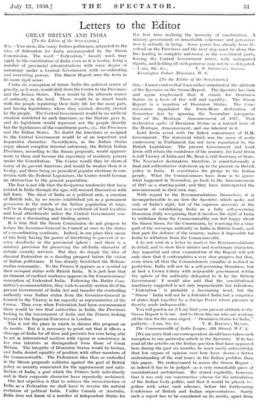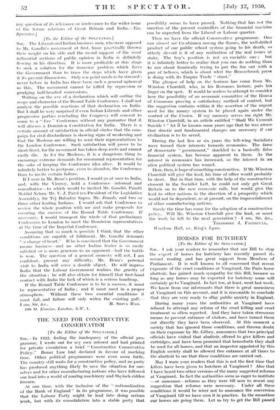[To The Editor of the SPECTATOR.] Sta,—I must confess that
I am rather surprised at the attitude of the Spectator on the Simon Report. The Spectator has time and again emphasized that it stands fur Dominion Status on a basis of free will and equality. The Simon Report is a negation of Dominion Status. The Com- missioners repudiated the Irwin-Renn declaration of November last by ignoring the November interpreta- tion of the Montagu Announcement of 1917. That declaration spoke of Dominion Status as a natural issue of the Montagu. Announcement, and one inherent in it.
Lord Irwin acted with the fullest concurrence of II.M.
Government. The statement which was the cause of acute controversy in Parliament has not been repudiated by the British Legislature. The present Government and Lord Irwin still retain the confidence of the country, for Lord Irwin is still Viceroy of India and Mr. Benn is still Secretary of State. The November declaration, therefore, is constitutionally a final and authoritative statement up to the present on British policy in India. It constitutes the pledge to the Indian people. What the Commissioners have done is to ignore what happened in November, go back to the Announcement of 1917 as a starting-point, and they have reinterpreted the announcement in their own way.
With regard to the Recommendations themselves, it is
incomprehensible to me how the Spectator, which spoke, not only of India's right, but of the supreme necessity at the moment of establishing India as a fully self-governing Dominion (fully recognizing that it involves the right of India to withdraw front the Commonwealth) can feel happy about the Simon thesis, for the Commission, by reserving for a time part of the sovereign authority in India in British hands, and that part I he defence of the country, makes it impossible for India to withdraw from the Commonwealth.
I do not wish in a letter to analyse the Recommendations
in detail, and to show their sinister and reactionary character. Any impartial and close examination of the Report will riot only show that it contemplates a very slow progress but that, even when all that the Commissioners visualize is realized in perfection, India will not be a self-governing Dominion, but at best a Crown Colony with responsible government within the sphere of the authority delegated to it by the British Government. I would also add that the constitutional machinery suggested is not only impracticable but ridiculous. " Federation " is probably a fascinating word, but the " Simon" India will not be a federated India but a congeries of states kept together by a foreign Power whose presence is thereby made indispensable.
You will pardon me if I say DIA your present attitude to the Simon Report is to me—and to those like me who are working all the time for the same object-- Dominion Status for India," V. K. KRIS!! !CA MENON.
pathetic.—I am, Sir, de.
The Commonwealth of India League, 203 Strand, 11..e. 2.
[We are sorry that our correspondent should have taken such exception to one particular article iri the Spectator. If he has read all the articles on the Indian question that have appeared here during the past six months, he must surely acknowledge that few organs of opinion over here have shown a better understanding of the real issues in the Indian problem than this paper. We endeavoured to assess the Simon Report— as indeed it has to be judged—as a very remarkable piece of constitutional architecture. We stated explicitly, however, that it was only one constructive scheme for the articulation of the Indian body politic, and that it would be placed, to- gether with other such schemes, before the forthcoming Conference of British and Indian representatives. Surely such a report has to be considered on its merits, apart from.
any question of its relevance or irrelevance to the wider issue of the future relations of Great Britain and India.--ED. Spectator]





































 Previous page
Previous page